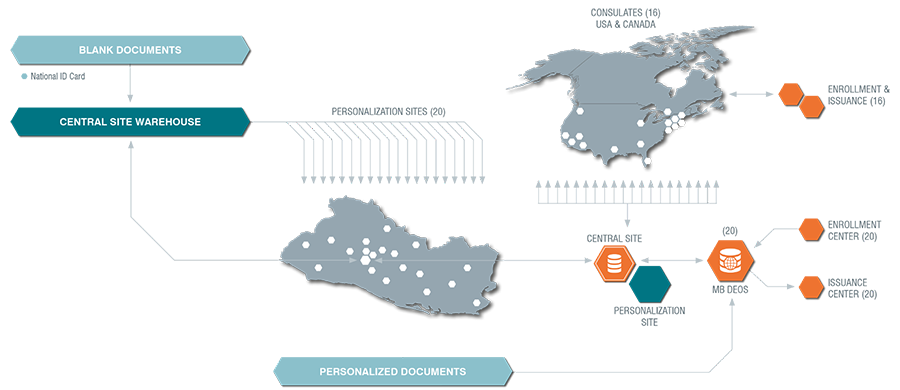Republic of El Salvador
National ID Card
In 2011, Mühlbauer was awarded by the Government of El Salvador to implement and operate a comprehensive National ID Card Solution for the inhabitants of El Salvador. The solution comprised twenty enrollment-, personalization- and issuance offices in El Salvador. In addition, Mühlbauer enabled 16 El Salvadorian consulates in the USA and Canada to receive applications and issue National ID Cards to El Salvadorian citizens.
The scope of the solution includes the actual ID card, approval and issuance clients, a national database, a biometric system, a data and document management system, secure communication with all sites (national and international) via MB DEOS, as well as personalization machines and software. The project is based on a Public Private Partnership agreement and executed as a Built-Operate-Transfer (BOT) project.
In June 2015, the BOT-project was renewed for five additional years. Within the scope of the contract extension, the second generation of ID cards with enhanced security features was issued. El Salvador was able to issue more than 6.2 million cards between 2015 and 2020.
Today, Mühlbauer employs over 250 people in El Salvador. Mühlbauer El Salvador, with its qualified staff, is the backbone for all Mühlbauer operations in Central America.
In 2021, the government of El Salvador signed a new contract to introduce further innovative technologies. Mühlbauer implemented a new polycarbonate ID card with multiple laser image (MLI), which carries the laser engraved birthdate and portrait of the cardholder. The personalization process is based upon the MB Alfresco® technology, a combination of laser engraving and inkjet printing for the portrait of the owner. This secures the document as forgers cannot easily remove or alter the picture, as it is applied on different layers of the card.
In the next step, Mühlbauer extended the physical card into a mobile ID. Therefore, Mühlbauer developed the MB Steel Reader app, a mobile application which holds the information of the physical document. This information can then be shared with institutions in private and public sectors, electronically. The new hardware to enable the digital changes also comprised self-enrollment kiosks distributed all over the country.

